Fleurs du Mal Magazine


Or see the index
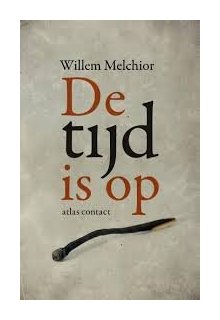
VPRO BOEKEN
Willem Melchior &
Jop de Vrieze
Zondag 22 juni in
VPRO Boeken
11.20 uur Nederland 1
De tijd is op – Willem Melchior
In de zomer van 2012 krijgt Willem Melchior te horen dat hij keelkanker heeft. Onderworpen aan een programma van onderzoeken, begeleiding en behandeling moet hij stoppen met roken, wat zoveel betekent dat hij – bevlogen roker – zijn dagelijkse schrijversbestaan opnieuw moet uitvinden. Willem Melchior komt vertellen over zijn ervaringen die hij heeft opgeschreven in zijn nieuwste boek De tijd is op.
 Allemaal beestjes – Jop de Vrieze
Allemaal beestjes – Jop de Vrieze
Ook te gast is Jop de Vrieze over Allemaal Beestjes. In Allemaal Beestjes gaat Jop de Vrieze op safari langs de miljarden bacteriën van het menselijk lichaam. Op heldere wijze beschrijft hij hoe lichaam en micro-organismen vanaf de geboorte met elkaar samenwerken en hoezeer onze gezondheid van deze samenwerking afhangt.
Zondag 22 juni 2014
in VPRO Boeken 11.20 uur Nederland 1
# meer informatie website vpro boeken
fleursdumal.nl magazine
More in: - Book News, Art & Literature News

The Sorrows of Young Werther (41) by J.W. von Goethe
MAY 25.
I have had a plan in my head of which I did not intend to speak to you
until it was accomplished: now that it has failed, I may as well mention
it. I wished to enter the army, and had long been desirous of taking
the step. This, indeed, was the chief reason for my coming here with the
prince, as he is a general in the service. I communicated my design to
him during one of our walks together. He disapproved of it, and it would
have been actual madness not to have listened to his reasons.
JUNE 11.
Say what you will, I can remain here no longer. Why should I remain?
Time hangs heavy upon my hands. The prince is as gracious to me as any
one could be, and yet I am not at my ease. There is, indeed, nothing
in common between us. He is a man of understanding, but quite of the
ordinary kind. His conversation affords me no more amusement than I
should derive from the perusal of a well-written book. I shall remain
here a week longer, and then start again on my travels. My drawings are
the best things I have done since I came here. The prince has a taste
for the arts, and would improve if his mind were not fettered by cold
rules and mere technical ideas. I often lose patience, when, with
a glowing imagination, I am giving expression to art and nature, he
interferes with learned suggestions, and uses at random the technical
phraseology of artists.
JULY 16.
Once more I am a wanderer, a pilgrim, through the world. But what else
are you!
JULY 18.
Whither am I going? I will tell you in confidence. I am obliged to
continue a fortnight longer here, and then I think it would be better
for me to visit the mines in–. But I am only deluding myself thus. The
fact is, I wish to be near Charlotte again, that is all. I smile at the
suggestions of my heart, and obey its dictates.
JULY 29.
No, no! it is yet well all is well! I her husband! O God, who gave me
being, if thou hadst destined this happiness for me, my whole life would
have been one continual thanksgiving! But I will not murmur–forgive
these tears, forgive these fruitless wishes. She–my wife! Oh, the very
thought of folding that dearest of Heaven’s creatures in my arms! Dear
Wilhelm, my whole frame feels convulsed when I see Albert put his arms
around her slender waist!
And shall I avow it? Why should I not, Wilhelm? She would have been
happier with me than with him. Albert is not the man to satisfy the
wishes of such a heart. He wants a certain sensibility; he wants–in
short, their hearts do not beat in unison. How often, my dear friend,
I’m reading a passage from some interesting book, when my heart and
Charlotte’s seemed to meet, and in a hundred other instances when our
sentiments were unfolded by the story of some fictitious character, have
I felt that we were made for each other! But, dear Wilhelm, he loves her
with his whole soul; and what does not such a love deserve?
I have been interrupted by an insufferable visit. I have dried my tears,
and composed my thoughts. Adieu, my best friend!
The Sorrows of Young Werther (Die Leiden des jungen Werther) by J.W. von Goethe. Translated by R.D. Boylan.
To be continued
fleursdumal.nl magazine
More in: -Die Leiden des jungen Werther, Goethe, Johann Wolfgang von

The Sorrows of Young Werther (40) by J.W. von Goethe
MARCH 24.
I have tendered my resignation to the court. I hope it will be accepted,
and you will forgive me for not having previously consulted you. It
is necessary I should leave this place. I know all you will urge me to
stay, and therefore I beg you will soften this news to my mother. I am
unable to do anything for myself: how, then, should I be competent to
assist others? It will afflict her that I should have interrupted that
career which would have made me first a privy councillor, and then
minister, and that I should look behind me, in place of advancing. Argue
as you will, combine all the reasons which should have induced me
to remain, I am going: that is sufficient. But, that you may not be
ignorant of my destination, I may mention that the Prince of–is here.
He is much pleased with my company; and, having heard of my intention
to resign, he has invited me to his country house, to pass the spring
months with him. I shall be left completely my own master; and, as we
agree on all subjects but one, I shall try my fortune, and accompany
him.
APRIL 19.
Thanks for both your letters. I delayed my reply, and withheld this
letter, till I should obtain an answer from the court. I feared my
mother might apply to the minister to defeat my purpose. But my request
is granted, my resignation is accepted. I shall not recount with what
reluctance it was accorded, nor relate what the minister has written:
you would only renew your lamentations. The crown prince has sent me
a present of five and twenty ducats; and, indeed, such goodness has
affected me to tears. For this reason I shall not require from my mother
the money for which I lately applied.
MAY 5.
I leave this place to-morrow; and, as my native place is only six miles
from the high road, I intend to visit it once more, and recall the happy
dreams of my childhood. I shall enter at the same gate through which
I came with my mother, when, after my father’s death, she left that
delightful retreat to immure herself in your melancholy town. Adieu, my
dear friend: you shall hear of my future career.
MAY 9.
I have paid my visit to my native place with all the devotion of a
pilgrim, and have experienced many unexpected emotions. Near the great
elm tree, which is a quarter of a league from the village, I got out of
the carriage, and sent it on before, that alone, and on foot, I might
enjoy vividly and heartily all the pleasure of my recollections. I stood
there under that same elm which was formerly the term and object of my
walks. How things have since changed! Then, in happy ignorance, I sighed
for a world I did not know, where I hoped to find every pleasure and
enjoyment which my heart could desire; and now, on my return from that
wide world, O my friend, how many disappointed hopes and unsuccessful
plans have I brought back!
As I contemplated the mountains which lay stretched out before me, I
thought how often they had been the object of my dearest desires. Here
used I to sit for hours together with my eyes bent upon them, ardently
longing to wander in the shade of those woods, to lose myself in those
valleys, which form so delightful an object in the distance. With what
reluctance did I leave this charming spot; when my hour of recreation
was over, and my leave of absence expired! I drew near to the village:
all the well-known old summerhouses and gardens were recognised again; I
disliked the new ones, and all other alterations which had taken place.
I entered the village, and all my former feelings returned. I cannot,
my dear friend, enter into details, charming as were my sensations:
they would be dull in the narration. I had intended to lodge in the
market-place, near our old house. As soon as I entered, I perceived that
the schoolroom, where our childhood had been taught by that good old
woman, was converted into a shop. I called to mind the sorrow, the
heaviness, the tears, and oppression of heart, which I experienced in
that confinement. Every step produced some particular impression. A
pilgrim in the Holy Land does not meet so many spots pregnant with
tender recollections, and his soul is hardly moved with greater
devotion. One incident will serve for illustration. I followed the
course of a stream to a farm, formerly a delightful walk of mine, and
paused at the spot, where, when boys, we used to amuse ourselves making
ducks and drakes upon the water. I recollected so well how I used
formerly to watch the course of that same stream, following it with
inquiring eagerness, forming romantic ideas of the countries it was to
pass through; but my imagination was soon exhausted: while the
water continued flowing farther and farther on, till my fancy became
bewildered by the contemplation of an invisible distance. Exactly such,
my dear friend, so happy and so confined, were the thoughts of our good
ancestors. Their feelings and their poetry were fresh as childhood.
And, when Ulysses talks of the immeasurable sea and boundless earth,
his epithets are true, natural, deeply felt, and mysterious. Of what
importance is it that I have learned, with every schoolboy, that the
world is round? Man needs but little earth for enjoyment, and still less
for his final repose.
I am at present with the prince at his hunting lodge. He is a man with
whom one can live happily. He is honest and unaffected. There are,
however, some strange characters about him, whom I cannot at all
understand. They do not seem vicious, and yet they do not carry the
appearance of thoroughly honest men. Sometimes I am disposed to believe
them honest, and yet I cannot persuade myself to confide in them. It
grieves me to hear the prince occasionally talk of things which he has
only read or heard of, and always with the same view in which they have
been represented by others.
He values my understanding and talents more highly than my heart, but I
am proud of the latter only. It is the sole source of everything of our
strength, happiness, and misery. All the knowledge I possess every one
else can acquire, but my heart is exclusively my own.
The Sorrows of Young Werther (Die Leiden des jungen Werther) by J.W. von Goethe. Translated by R.D. Boylan.
To be continued
fleursdumal.nl magazine
More in: -Die Leiden des jungen Werther, Goethe, Johann Wolfgang von
Kristofer Schipp er & Petra Couvée # Aanstaande zondag in VPRO Boeken # 11.20 uur Ned 1 # zo 15 juni 2014
er & Petra Couvée # Aanstaande zondag in VPRO Boeken # 11.20 uur Ned 1 # zo 15 juni 2014
De bekende sinoloog Kristofer Schipper komt vertellen over zijn vertaling van Confucius. De gesprekken.
Schipper geeft de eerste volledige, rechtstreeks uit het klassiek Chinees gemaakte, Nederlandse vertaling van dit werk en voorziet het van een op de oude exegetische literatuur berustende toelichting.
De gesprekken – Confucius, vertaald door Kristofer Schipper: Sinoloog Rik Schipper vertaalde tot groot genoegen van veel lezers een paar taoistische meesterwerken.
Onlangs verscheen zijn vertaling van De Gesprekken van Confucius.
Ook te gast is Petra Couvée, slaviste en docente Nederlands aan de Staatuniversiteit van Sint-Petersburg.
Petra Couvée schreef samen met Peter Finn De zaak Zjivago: een spannend geschreven boek over een fascinerende periode uit de recente geschiedenis en over de roman Dokter Zjivago die de wereld op z’n kop zette.
 De zaak Zjivago – Petra Couvee, Peter Finn:
De zaak Zjivago – Petra Couvee, Peter Finn:
Het is 1957. Dokter Zjivago van Boris Pasternak wordt in het Westen gedrukt en gebruikt als wapen in de Koude oorlog.
Maar waarom verboden de Russen het boek. Was dat wel zo’n handige politieke daad?
# Meer informatie website VPRO BOEKEN
fleursdumal.nl magazine
More in: - Book News, Art & Literature News
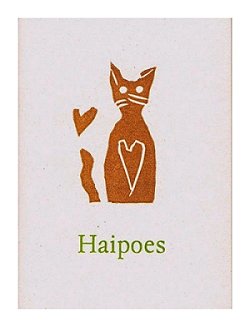
Haipoes, nieuwe dichtbundel van Freda Kamphuis
Onlangs is de nieuwe haikubundel ‘Haipoes’ van Freda Kamphuis uitgegeven binnen het poëziefonds van Triona Pers in Houwerzijl.
Haipoes bevat 10 haiku’s over katten en andere dieren. Uitgever Dick Ronner heeft het bundeltje met de hand gedrukt van de Lectura. De vinylsnede op het omslag heeft (dubbeltalent: beeldend kunstenaar en schrijver) Freda Kamphuis speciaal voor deze bundel gemaakt.
in katzwijm
kat ligt op het dak
op en top een kat te zijn
zo lui als een zwijn
Haipoes is te bestellen via de link: http://www.zolderman.nl/triona/index.html
Haipoes meet 7 x 10 cm, telt 16 pagina’s en kost € 3,50.
# Meer informatie website Freda Kamphuis
fleursdumal.nl magazine
More in: - Book News, Archive K-L, Art & Literature News, Kamphuis, Freda

The Sorrows of Young Werther (39) by J.W. von Goethe
MARCH 16.
Everything conspires against me. I met Miss B–walking to-day. I could
not help joining her; and, when we were at a little distance from her
companions, I expressed my sense of her altered manner toward me. “O
Werther!” she said, in a tone of emotion, “you, who know my heart, how
could you so ill interpret my distress? What did I not suffer for you,
from the moment you entered the room! I foresaw it all, a hundred times
was I on the point of mentioning it to you. I knew that the S—-s and
T—-s, with their husbands, would quit the room, rather than remain in
your company. I knew that the count would not break with them: and
now so much is said about it.” “How!” I exclaimed, and endeavoured to
conceal my emotion; for all that Adelin had mentioned to me yesterday
recurred to me painfully at that moment. “Oh, how much it has already
cost me!” said this amiable girl, while her eyes filled with tears.
I could scarcely contain myself, and was ready to throw myself at her
feet. “Explain yourself!” I cried. Tears flowed down her cheeks. I
became quite frantic. She wiped them away, without attempting to conceal
them. “You know my aunt,” she continued; “she was present: and in
what light does she consider the affair! Last night, and this morning,
Werther, I was compelled to listen to a lecture upon my acquaintance
with you. I have been obliged to hear you condemned and depreciated; and
I could not–I dared not–say much in your defence.”
Every word she uttered was a dagger to my heart. She did not feel what a
mercy it would have been to conceal everything from me. She told me, in
addition, all the impertinence that would be further circulated, and how
the malicious would triumph; how they would rejoice over the punishment
of my pride, over my humiliation for that want of esteem for others with
which I had often been reproached. To hear all this, Wilhelm, uttered by
her in a voice of the most sincere sympathy, awakened all my passions;
and I am still in a state of extreme excitement. I wish I could find a
man to jeer me about this event. I would sacrifice him to my resentment.
The sight of his blood might possibly be a relief to my fury. A hundred
times have I seized a dagger, to give ease to this oppressed heart.
Naturalists tell of a noble race of horses that instinctively open a
vein with their teeth, when heated and exhausted by a long course, in
order to breathe more freely. I am often tempted to open a vein, to
procure for myself everlasting liberty.
The Sorrows of Young Werther (Die Leiden des jungen Werther) by J.W. von Goethe. Translated by R.D. Boylan.
To be continued
fleursdumal.nl magazine
More in: -Die Leiden des jungen Werther, Goethe, Johann Wolfgang von
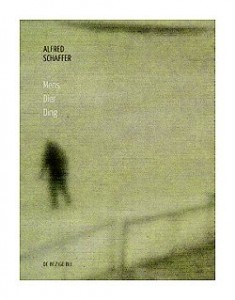 Alfred Schaffer &
Alfred Schaffer &
Jules Deelder
in VPRO Boeken
Van 10 tot en met 14 juni ontmoeten dichters van over de hele wereld elkaar voor de 45e keer tijdens het Poetry International Festival Rotterdam.
Een nieuwe, veelzijdige golf poëzie stroomt met hun voordrachten, lezingen, interviews, maar ook in speciale programma’s en publicaties via Rotterdam het land binnen.
De dichter, het gedicht, de vertaling; de voordrachten van de festivaldichters vormen het hart van het Poetry International Festival.
Speciale programma’s brengen daarnaast iedere dag vooraanstaande dichters en opvallende poëzie voor het voetlicht zoals de dichters Jules Deelder en Alfred Schaffer.
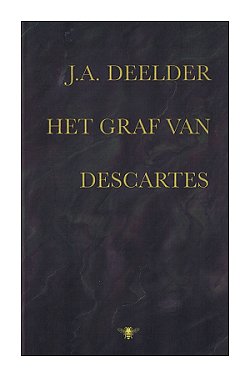 In VPRO Boeken praat Wim Brands met Alfred Schaffer naar aanleiding van zijn laatste bundel Mens dier ding waarin hij het leven van de gewelddadige leider Shaka Zoeloe gebruikt om Zuid-Afrika, het land waar hij tegenwoordig woont, poëtisch te verbeelden.
In VPRO Boeken praat Wim Brands met Alfred Schaffer naar aanleiding van zijn laatste bundel Mens dier ding waarin hij het leven van de gewelddadige leider Shaka Zoeloe gebruikt om Zuid-Afrika, het land waar hij tegenwoordig woont, poëtisch te verbeelden.
Jules Deelder praat over zijn laatste dichtbundel Het graf van Descartes maar Brands zal met hem ook praten over zijn klassiekers, zoals Heelal: Hoe verder men keek hoe groter het leek.
En waarom schrijft Deelder nooit over sex, behalve dan: Fuck Sex.
zondag 8 juni in VPRO Boeken Nederland 1 om 11.20 uur
fleursdumal.nl magazine
More in: - Book News, Archive C-D, Archive S-T, Art & Literature News, Poetry International

The Sorrows of Young Werther (38) by J.W. von Goethe
MARCH 15.
I have just had a sad adventure, which will drive me away from here. I
lose all patience!–Death!–It is not to be remedied; and you alone are
to blame, for you urged and impelled me to fill a post for which I was
by no means suited. I have now reason to be satisfied, and so have you!
But, that you may not again attribute this fatality to my impetuous
temper, I send you, my dear sir, a plain and simple narration of the
affair, as a mere chronicler of facts would describe it.
The Count of O–likes and distinguishes me. It is well known, and I have
mentioned this to you a hundred times. Yesterday I dined with him. It is
the day on which the nobility are accustomed to assemble at his house
in the evening. I never once thought of the assembly, nor that we
subalterns did not belong to such society. Well, I dined with the count;
and, after dinner, we adjourned to the large hall. We walked up and down
together: and I conversed with him, and with Colonel B–, who joined us;
and in this manner the hour for the assembly approached. God knows, I
was thinking of nothing, when who should enter but the honourable Lady
accompanied by her noble husband and their silly, scheming daughter,
with her small waist and flat neck; and, with disdainful looks and a
haughty air they passed me by. As I heartily detest the whole race,
I determined upon going away; and only waited till the count had
disengaged himself from their impertinent prattle, to take leave, when
the agreeable Miss B–came in. As I never meet her without experiencing
a heartfelt pleasure, I stayed and talked to her, leaning over the
back of her chair, and did not perceive, till after some time, that she
seemed a little confused, and ceased to answer me with her usual ease
of manner. I was struck with it. “Heavens!” I said to myself, “can she,
too, be like the rest?” I felt annoyed, and was about to withdraw; but I
remained, notwithstanding, forming excuses for her conduct, fancying she
did not mean it, and still hoping to receive some friendly recognition.
The rest of the company now arrived. There was the Baron F–, in an
entire suit that dated from the coronation of Francis I.; the Chancellor
N–, with his deaf wife; the shabbily-dressed I–, whose old-fashioned
coat bore evidence of modern repairs: this crowned the whole.
I conversed with some of my acquaintances, but they answered me
laconically. I was engaged in observing Miss B–, and did not notice
that the women were whispering at the end of the room, that the murmur
extended by degrees to the men, that Madame S–addressed the count with
much warmth (this was all related to me subsequently by Miss B–); till
at length the count came up to me, and took me to the window. “You know
our ridiculous customs,” he said. “I perceive the company is rather
displeased at your being here. I would not on any account–” “I beg
your excellency’s pardon!” I exclaimed. “I ought to have thought of
this before, but I know you will forgive this little inattention. I was
going,” I added, “some time ago, but my evil genius detained me.” And I
smiled and bowed, to take my leave. He shook me by the hand, in a manner
which expressed everything. I hastened at once from the illustrious
assembly, sprang into a carriage, and drove to M–. I contemplated the
setting sun from the top of the hill, and read that beautiful passage in
Homer, where Ulysses is entertained by the hospitable herdsmen. This was
indeed delightful.
I returned home to supper in the evening. But few persons were assembled
in the room. They had turned up a corner of the table-cloth, and were
playing at dice. The good-natured A–came in. He laid down his hat when
he saw me, approached me, and said in a low tone, “You have met with
a disagreeable adventure.” “I!” I exclaimed. “The count obliged you to
withdraw from the assembly!” “Deuce take the assembly!” said I. “I was
very glad to be gone.” “I am delighted,” he added, “that you take it
so lightly. I am only sorry that it is already so much spoken of.” The
circumstance then began to pain me. I fancied that every one who sat
down, and even looked at me, was thinking of this incident; and my heart
became embittered.
And now I could plunge a dagger into my bosom, when I hear myself
everywhere pitied, and observe the triumph of my enemies, who say that
this is always the case with vain persons, whose heads are turned with
conceit, who affect to despise forms and such petty, idle nonsense.
Say what you will of fortitude, but show me the man who can patiently
endure the laughter of fools, when they have obtained an advantage over
him. ‘Tis only when their nonsense is without foundation that one can
suffer it without complaint.
The Sorrows of Young Werther (Die Leiden des jungen Werther) by J.W. von Goethe. Translated by R.D. Boylan.
To be continued
fleursdumal.nl magazine
More in: -Die Leiden des jungen Werther, Goethe, Johann Wolfgang von
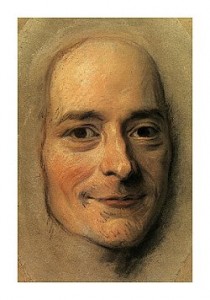
Voltaire
(1694-1778)
À une jeune veuve
Jeune et charmant objet à qui pour son partage
Le ciel a prodigué les trésors les plus doux,
Les grâces, la beauté, l’esprit, et le veuvage,
Jouissez du rare avantage
D’être sans préjugés, ainsi que sans époux !
Libre de ce double esclavage,
Joignez à tous ces dons celui d’en faire usage ;
Faites de votre lit le trône de l’Amour ;
Qu’il ramène les Ris, bannis de votre cour
Par la puissance maritale.
Ah ! ce n’est pas au lit qu’un mari se signale :
Il dort toute la nuit et gronde tout le jour ;
Ou s’il arrive par merveille
Que chez lui la nature éveille le désir,
Attend-il qu’à son tour chez sa femme il s’éveille ?
Non : sans aucun prélude il brusque le plaisir ;
Il ne connaît point l’art d’animer ce qu’on aime,
D’amener par degrés la volupté suprême :
Le traître jouit seul… si pourtant c’est jouir.
Loin de vous tous liens, fût-ce avec Plutus même !
L’Amour se chargera du soin de vous pourvoir.
Vous n’avez jusqu’ici connu que le devoir,
Le plaisir vous reste à connaître.
Quel fortuné mortel y sera votre maître !
Ah ! lorsque, d’amour enivré,
Dans le sein du plaisir il vous fera renaître,
Lui-même trouvera qu’il l’avait ignoré.
Voltaire poetry
fleursdumal.nl magazine
More in: Archive U-V, Voltaire
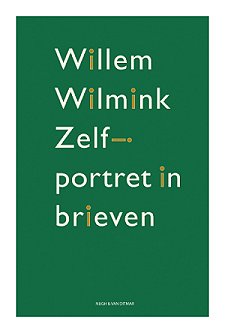 Elsbeth Etty & Hans Dorrestijn
Elsbeth Etty & Hans Dorrestijn
in VPRO BOEKEN
over Willem Wilmink
zondag 01 juni 2014 om 10.30 uur
Naar aanleiding van het pas verschenen Willem Wilmink: Zelfportret in brieven, zijn Elsbeth Etty en Hans Dorrestijn te gast om over Willem Wilmink te vertellen. Willem Wilmink was vooral bekend als dichter en tekstschrijver van liedjes. Daarnaast schreef hij honderden brieven aan familie en vrienden : dankbrieven, excuusbrieven, liefdesbrieven, afwijsbrieven, mopperbrieven en ruziebrieven. Elsbeth Etty is de biografie over Willem Wilmink aan het schrijven en Hans Dorrestijn was naast collega-schrijver en dichter ook een goede vriend van hem.
fleursdumal.nl magazine
More in: - Book News, Art & Literature News

The Sorrows of Young Werther (37) by J.W. von Goethe
FEBRUARY 8.
For a week past we have had the most wretched weather: but this to me
is a blessing; for, during my residence here, not a single fine day has
beamed from the heavens, but has been lost to me by the intrusion
of somebody. During the severity of rain, sleet, frost, and storm, I
congratulate myself that it cannot be worse indoors than abroad, nor
worse abroad than it is within doors; and so I become reconciled. When
the sun rises bright in the morning, and promises a glorious day, I
never omit to exclaim, “There, now, they have another blessing
from Heaven, which they will be sure to destroy: they spoil
everything,–health, fame, happiness, amusement; and they do this
generally through folly, ignorance, or imbecility, and always, according
to their own account, with the best intentions!” I could often
beseech them, on my bended knees, to be less resolved upon their own
destruction.
FEBRUARY 17.
I fear that my ambassador and I shall not continue much longer together.
He is really growing past endurance. He transacts his business in so
ridiculous a manner, that I am often compelled to contradict him, and do
things my own way; and then, of course, he thinks them very ill done. He
complained of me lately on this account at court; and the minister gave
me a reprimand,–a gentle one it is true, but still a reprimand. In
consequence of this, I was about to tender my resignation, when I
received a letter, to which I submitted with great respect, on
account of the high, noble, and generous spirit which dictated it. He
endeavoured to soothe my excessive sensibility, paid a tribute to my
extreme ideas of duty, of good example, and of perseverance in business,
as the fruit of my youthful ardour, an impulse which he did not seek
to destroy, but only to moderate, that it might have proper play and be
productive of good. So now I am at rest for another week, and no longer
at variance with myself. Content and peace of mind are valuable things:
I could wish, my dear friend, that these precious jewels were less
transitory.
FEBRUARY 20.
God bless you, my dear friends, and may he grant you that happiness
which he denies to me!
I thank you, Albert, for having deceived me. I waited for the news that
your wedding-day was fixed; and I intended on that day, with solemnity,
to take down Charlotte’s profile from the wall, and to bury it with
some other papers I possess. You are now united, and her picture still
remains here. Well, let it remain! Why should it not? I know that I
am still one of your society, that I still occupy a place uninjured in
Charlotte’s heart, that I hold the second place therein; and I intend
to keep it. Oh, I should become mad if she could forget! Albert, that
thought is hell! Farewell, Albert farewell, angel of heaven farewell,
Charlotte!
The Sorrows of Young Werther (Die Leiden des jungen Werther) by J.W. von Goethe. Translated by R.D. Boylan.
To be continued
fleursdumal.nl magazine
More in: -Die Leiden des jungen Werther, Goethe, Johann Wolfgang von
Guy de Maupassant
(1850-1893)
SUR LA MORT DE LOUIS BOUILHET
Il est mort, lui, mon maître ; il est mort, et pourquoi?
Lui si bon, lui si grand, si bienveillant pour moi.
Tu choisis donc, Seigneur, dans ce monde où nous sommes,
Et pour nous les ravir, tu prends les plus grands hommes.
C’est ainsi que l’on meurt, infirmes que nous sommes,
Et c’est en vain, Seigneur, que ceux qui restent pleurent,
Que se fait-il au ciel quand partent de tels hommes?
Oh ! ces gens-là, grand Dieu, pourquoi veux-tu qu’ils meurent?
As-tu donc besoin d’eux dans ta gloire infinie?
Il est mort, est-ce vrai ? Qu’est-ce donc que ces morts?
Il ne reste plus rien, mais rien qu’un pauvre corps,
Rien de lui. Même pas ce bienveillant sourire
Qui nous attirait tant et semblait toujours dire :
“Mon ami je vous aime.” Et ce regard si beau,
Ce grand oeil clair et doux si plein d’intelligence,
On sent qu’il doit souffrir une horrible souffrance
Pour demeurer ainsi fixe dans son tombeau.
Mais non, c’est encore là l’insondable mystère.
Puisque le grain de blé renaît et sort de terre,
Puisque rien ne périt dans la création,
Puisque tout est progrès et transformation,
Il n’a fait que laisser sa dépouille mortelle.
Mais son âme, mon Dieu, maintenant que fait-elle?
Nous a-t-elle quittés pour rejoindre si tôt
Tous ses grands frères morts qui l’attendaient là-haut?
Dans quel monde inconnu va-t-elle errer, cette âme,
Cette âme de poète au grand oeil caressant
Qui nous lançait parfois un éclair si puissant
Qu’il nous éblouissait ainsi qu’un jet de flammes.
Et cet oeil… Il fait peur avec sa fixité
Et semble épouvanté d’une horreur inconnue
Comme s’il avait vu devant nous s’agiter
L’âme qui l’animait tout à coup revenue!…
Ah ! si vous l’aviez vu sous ses poiriers en fleurs,
Quand son bras sur mon bras, jasant en vieux rimeurs,
Il ouvrait sa belle âme aux longues causeries
Qui me laissaient après de longues rêveries,
Car il était si franc, si simple et naturel,
Pauvre Bouilhet ! Lui mort ! si bon, si paternel!
Lui qui m’apparaissait comme un autre Messie
Avec la clef du ciel où dort la poésie.
Et puis le voilà mort et parti pour jamais
Vers ce monde éternel où le génie aspire.
Mais de là-haut, sans doute, il nous voit et peut lire
Ce que j’avais au coeur et combien je l’aimais.
Louis Bouilhet étant mort le 18 juillet 1869.
Guy de Maupassant poetry
fleursdumal.nl magazine
More in: Archive M-N, Guy de Maupassant, Maupassant, Guy de
Thank you for reading Fleurs du Mal - magazine for art & literature